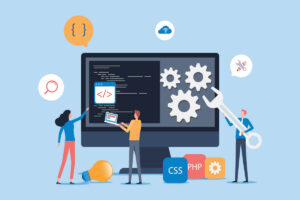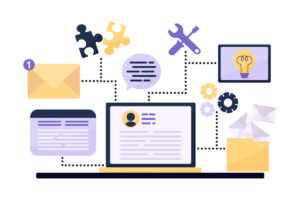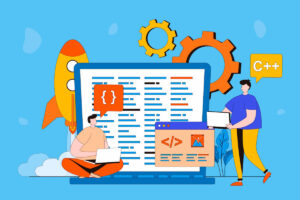In today’s digital age, having a strong online presence is essential for businesses to stay competitive. Full stack PHP development is a powerful tool that can help CEOs and CTOs take their company to the next level. In this strategic guide, we will explore the benefits of full stack PHP development and how it can be leveraged to drive growth and success.
What is Full Stack PHP Development?
Full stack PHP development refers to the practice of using PHP, a popular scripting language, to build both the front-end and back-end of a website or web application. This approach allows developers to work on all aspects of a project, from the user interface to the server-side logic, making it a versatile and efficient choice for web development.
PHP is a server-side scripting language primarily used for web development but also used as a general-purpose programming language. It is known for its simplicity, flexibility, and ease of integration with other technologies. Full stack PHP development involves using PHP for both front-end and back-end development, allowing for seamless communication between the two components.
When it comes to full stack PHP development, developers have access to a wide range of frameworks and libraries that can streamline the development process. Frameworks such as Laravel and Symfony provide tools and features that help developers build robust and scalable web applications. By leveraging these frameworks, businesses can accelerate development cycles and deliver high-quality products to market faster.
Benefits of Full Stack PHP Development
- Cost-Effective: Using PHP for both front-end and back-end development can save businesses time and money by streamlining the development process. Businesses can avoid the cost of hiring separate front-end and back-end developers, resulting in cost savings.
- Flexibility: PHP is a flexible language that can be easily integrated with other technologies, allowing for scalability and customization. Developers can leverage the versatility of PHP to build custom solutions tailored to the specific needs of the business.
- Speed: Full stack PHP development allows for faster development cycles, enabling businesses to bring their products to market more quickly. By eliminating the need to switch between different programming languages, developers can focus on writing efficient code and delivering projects on time.
- Security: PHP has a strong track record of security and is regularly updated to address vulnerabilities, making it a reliable choice for secure web development. Businesses can rest assured that their web applications built with PHP are secure and protected against potential threats.
- Community Support: PHP has a large and active developer community, providing access to resources and support for businesses using the language. Developers can benefit from community forums, online tutorials, and documentation to enhance their skills and stay updated on the latest trends in PHP development.
How to Leverage Full Stack PHP Development
- Define Your Goals: Before embarking on a full stack PHP development project, it’s important to clearly define your goals and objectives. This will help guide the development process and ensure that the end product aligns with your business strategy. Identify key performance indicators (KPIs) and milestones to measure the success of the project.
- Hire the Right Talent: Finding skilled developers with experience in full stack PHP development is crucial to the success of your project. Look for candidates who have a strong understanding of PHP and are familiar with both front-end and back-end development. Conduct thorough interviews and review portfolios to assess the expertise of potential hires.
- Create a Roadmap: Develop a detailed roadmap outlining the milestones and timelines for your full stack PHP development project. This will help keep the project on track and ensure that deadlines are met. Break down the project into manageable tasks and allocate resources accordingly to streamline the development process.
- Test and Iterate: Testing is an essential part of the development process. Be sure to thoroughly test your full stack PHP application for bugs and usability issues, and iterate on the design based on user feedback. Conduct user acceptance testing (UAT) to gather feedback from stakeholders and make necessary revisions to improve the user experience.
- Monitor Performance: Once your full stack PHP application is live, it’s important to monitor its performance and gather data on user engagement. Use analytics tools to track key metrics such as website traffic, conversion rates, and user behavior. Analyze the data to identify areas for improvement and make data-driven decisions to optimize the performance of your web application.
Conclusion
Full stack PHP development is a valuable asset for CEOs and CTOs looking to enhance their online presence and drive business growth. By leveraging the benefits of PHP, businesses can create dynamic and secure web applications that meet the needs of their customers. By following the strategic guide outlined above, CEOs and CTOs can unlock the full potential of full stack PHP development and take their company to new heights.
FAQs:
What is Full Stack PHP Development?
Full stack PHP development refers to the practice of using PHP to build both the front-end and back-end of a website or web application.
What are the benefits of Full Stack PHP Development?
- Cost-Effective
- Flexibility
- Speed
- Security
- Community Support
How can businesses leverage Full Stack PHP Development?
- Define Your Goals
- Hire the Right Talent
- Create a Roadmap
- Test and Iterate
Why is it important to hire skilled developers for Full Stack PHP Development projects?
Hiring skilled developers with experience in full stack PHP development is crucial for the success of the project as they need to have a strong understanding of PHP and be familiar with both front-end and back-end development.












+ There are no comments
Add yours